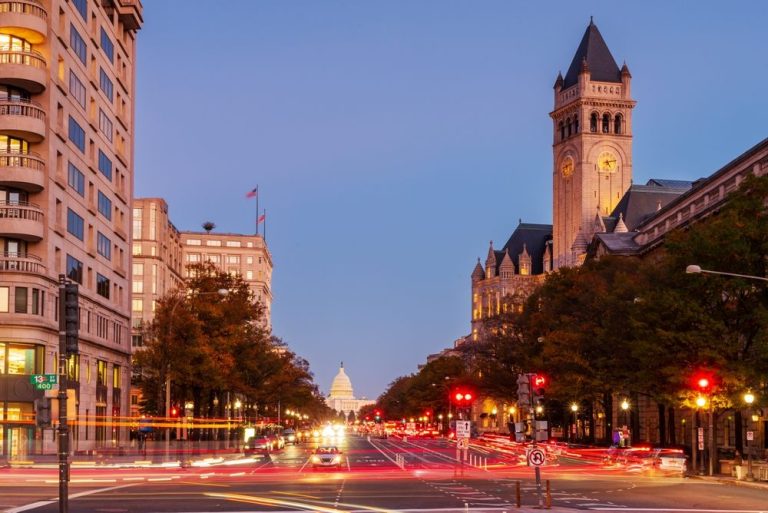This month in The ICR D.C. Insider, get our insights and analysis about developments in Washington that could have an immediate and long-term impact on your business. We touch on a possible government shutdown, news from the SEC, key developments in China, and more.
What’s Next In Washington
- Government Shutdown? – With the election of Rep. Mike Johnson (R-La.) as Speaker of the House, the debate in Washington has now turned to a range of budget issues. Chief among them is finding a path to fund the federal government once the current Continuing Resolution (CR) expires on November 17th. There is some optimism that another agreement on a stopgap funding measure can be reached, even as disagreements over aid to Israel, Ukraine, and strengthening the southern border intensify. This funding would allow the Securities and Exchange Commission (SEC) to remain open to continue to review registration statements for companies on the verge of public offerings, enable the Federal Trade Commission (FTC) and Justice Department to review merger applications in the normal course of business, and prevent the interruption of other ongoing federal government operations.
SEC
- More Information on Short Selling – With a party-line 3-2 vote, the Securities and Exchange Commission (SEC) enacted a new rule that will require institutional money managers with large short positions to file a new SEC form detailing their bets at the end of each month. Then, the Commission will aggregate the data and publish it for the market. The positions and identities of individual short sellers will not be published, but investors will get a new window into which companies are being shorted.
- Timeframe to Disclose 5% Stake in Companies Shortened – Entities will now have 5 business days, not 10 calendar days, to disclose that they have reached 5% ownership stakes in companies they intend to control. The rule also shortens the disclosure deadline for certain institutional investors to 45 days from the end of the quarter in which their ownership stake surpasses 5%. Previously, the deadline was 45 days from the end of the calendar year.
- Climate Change Disclosure Rule – SEC Chair Gary Gensler continues to work to drive support for the Commission’s climate change disclosure rule, including a speech before the U.S. Chamber of Commerce (a group that has voiced its displeasure with the rule, as drafted). In response to suggestions that Gensler is reconsidering parts of the rule proposal, Rep. Maxine Waters (D-Ca.) urged Gensler to quickly finalize the rule without abandoning a mandate for companies to disclose their so-called Scope 3 emissions, which cover climate impacts throughout their supply chains. She also asked Gensler to include attestation requirements and transition plan disclosures.
- As expected, California Governor Gavin Newsom signed into law requirements that companies which meet specific revenue thresholds disclose their carbon footprints and climate-related financial risks starting in 2026. The new requirements strengthen the case for a federal rule.
- ESG Dropped From List of Compliance Priorities in 2024 – SEC examiners are downplaying Environmental, Social, and Governance (ESG) investing as a focus when inspecting SEC-registered investment advisers, investment companies, broker-dealers, transfer agents, municipal advisors, securities-based swap dealers, clearing agencies, and other self-regulatory organizations for compliance with agency rules after years of listing ESG as a priority.
- Eighteen Republican state financial officers are demanding answers from the two largest proxy advisors on Wall Street in the latest battle over ESG and what they term “woke” investing. The letters, which were sent to Glass Lewis and Institutional Shareholder Services (ISS), accuse the two of favoring left-leaning initiatives and freezing out conservatives.
- NASDAQ Board Diversity Rule – Following a lengthy opinion by a three-judge panel in the New Orleans-based 5th U.S. Circuit Court of Appeals that upheld NASDAQ’s board diversity rule, a conservative activist group that opposes the mandate asked the full panel of judges to rehear the case.
- “Proactive Compliance” Noted as a Priority – SEC Enforcement Division Director Gurbir Grewal doubled down on the need for companies to create a culture of proactive compliance. Doing so will require compliance professionals to learn the relevant regulations for their businesses, engage with personnel across business units, and self-report possible misconduct to the SEC.
- Enforcement Penalties Fell in FY2023 as Industry Bars Rose – The SEC levied $5 billion through enforcement actions in 780 actions and barred 133 individuals from serving as company directors and officers in fiscal year 2023.
FTC
- Ban on Junk Fees Proposed – The Federal Trade Commission (FTC) announced a new proposed rule to prohibit junk fees, estimating that these fees can cost consumers an extra $80 billion per year. The rule would require businesses to include all mandatory fees when telling consumers a price, making it easier for consumers to comparison shop. This effort is part of the Biden Administration’s broader focus on junk fees, which includes initiatives at the Consumer Financial Protection Bureau (CFPB), the Federal Communications Commission (FCC), the Department of Housing and Urban Development (HUD), and the Department of Transportation (DOT).
- Also, the Department of Labor moved to broaden the kinds of retirement advice subject to strict fiduciary standards. The White House touted the proposed rules as part of its attempt to eliminate hidden junk fees, reshaping the financial industry’s stake in a $10 trillion 401(k) market.
- Just ahead of the federal action, California Governor Gavin Newsom signed into law a bill that prohibits hidden fees.
- Data Breach Reporting – The FTC approved an amendment to its Safeguards Rule that will require non-banking financial institutions – such as mortgage brokers, motor vehicle dealers, and payday lenders – to report certain data breaches and other security events to the agency no later than 30 days after discovery of a security breach involving the information of at least 500 consumers. The FTC will enter the notifications of these breaches into a publicly available database, pending some restrictions.
- Commission Gets Closer to Full Strength – The Senate Commerce Committee voted to send three nominees to the full Senate for a vote. They include the renomination of Commissioner Rebecca Slaughter, a Democrat, along with the nominations of two Republicans, Andrew Ferguson and Melissa Holyoak, the solicitors general of Virginia and Utah, respectively.
Labor & NLRB
- New Joint Employer Rule Takes Aim at Franchisers & Others – In a major 3-1 ruling, the National Labor Relations Board (NLRB) increased the likelihood of franchisors being held liable with their franchisees for labor terms and conditions such as union contracts, pay, scheduling, and more. With the new rule, companies designated as joint employers will share liability and will have a legal obligation to negotiate with unions. Under the new pro-labor definition, franchisors and franchisees may be considered joint employers if each has “an employment relationship with the employees” and they “share or codetermine one or more of the employees’ essential concerns or conditions of employment.” The NLRB identified seven essential terms and conditions. The new rule takes effect December 26th and overturns a 2020 ruling.
- New Child Labor Legislation Proposed – In a bipartisan initiative, Sens. Josh Hawley (R-Mo.) and Cory Booker (D-N.J.) have proposed cracking down on the use of child labor. The Preventing Child Labor Exploitation Act would, among other measures:
- Prevent the U.S. government from signing contracts with companies that have violated child labor laws.
- Require companies vying for federal contracts to disclose past violations, and penalize them if they don’t.
- Empower the Labor Department to compile a list of violators that are ineligible for federal deals.
DOJ
- Additional Incentives to Self-Report Wrongdoing in M&A Transactions – The Department of Justice (DOJ) announced a new policy that will give companies more lenient treatment if they report potential criminal misconduct uncovered during the merger and acquisition process. Under the new policy, an acquiring company that discloses potential wrongdoing at a company being acquired within six months of the deal closing date – and fully cooperates and fixes the underlying problems within a year of closing – can presume it won’t be prosecuted by the Justice Department.
Additional Key Developments
- China – Key developments include:
- President Biden and Chinese President Xi Jinping have agreed to meet on the sidelines of the November Asia-Pacific Economic Cooperation summit in San Francisco. The agenda, along with other details, continue to be developed.
- The Commerce Department tightened the curbs on the export of AI chips to China. The updated rules significantly expand the U.S. Government’s authority to determine what products U.S. companies can and can’t sell in the name of national security. The rules also work to stem shipments of chips to China by way of other countries, expanding the export restrictions to include overseas subsidiaries of Chinese companies and 21 additional countries.
- At the same time, the U.S. told South Korea’s Samsung Electronics and SK Hynix, as well as Taiwan Semiconductor Manufacturing Co. (the world’s largest contract chip maker), that they can maintain their current operations in China for the foreseeable future, though significant tech upgrades would prove difficult.
- Three U.S. and British due-diligence companies are retreating from Hong Kong, the latest sign of concern among foreign companies as business dwindles and Chinese authorities crack down on corporate intelligence gathering. The type of work these companies do includes commercial investigations for pre-IPO transactions, mergers and acquisitions, and antifraud and corruption probes, as well as investigations for companies on ESG issues, such as human rights and environmental abuses in the supply chain.
- Sen. Bill Cassidy, M.D. (R-La.), a member of the Senate Energy and Natural Resources Committee, wrote in Foreign Affairs about his forthcoming Foreign Pollution Fee legislation, that would impose a “foreign pollution fee” on goods imported into the U.S. that are made with higher emissions than domestic goods. The bill is meant to level the playing field for U.S. manufactures who have higher costs due to stricter environmental regulations compared to Chinese manufacturers, and would also give low- and middle-income countries greater access to U.S. markets and development financing in exchange for better environment regulations.
- In a letter, a bipartisan group of eight senators asked that the Biden Administration convene an interagency response group to tackle Chinese textiles and apparel manufactured with allegedly slave labor. The Senators – including several on the Senate Finance Committee which has jurisdiction on trade – want the White House to convene an interagency meeting with key leadership from the U.S. Trade Representative (USTR), Department of Commerce, Department of Homeland Security, Department of the Treasury, and the National Security Council to address this issue.
- In the House, a bipartisan group of 10 members of the House Ways & Means Committee (which has jurisdiction over trade) wrote to U.S. Customs and Border Protection (CBP) Acting Commissioner Troy Miller about the Uyghur Forced Labor Prevention Act (UFLPA), and urged him to increase efforts to block imports made in Xinjiang Province, potentially done with forced labor. The letter specifically called out the high risk that forced labor poses to the solar industry supply chain.



